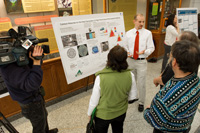Local teachers who attended in the fifth Notre Dame extended Research Community (NDeRC) Collaborating for Education and Research Forum heard from a wide array of campus and community resources ready to help them enhance STEM (science, technology, engineering and math) education in their classrooms.
Jay Caponigro, Notre Dame’s director of community engagement, also told them that the University has recently compiled a database of resources, from individual graduate students to large programs, and an online listing of events, EdConnex (publicaffairs.nd.edu/k-12-education/edconnex/), available through the year.

“We have a lot of resources to leverage,” said Caponigro, a member of the South Bend Community School Corporation board.
The Forum, organized by Tom Loughran and Pat Mooney of NDeRC, gave broad face-to-face exposure to programs based at Notre Dame, including NDeRC, the Institute for Educational Initiatives and the Center for Sustainable Energy at Notre Dame, as well as other programs including the Indiana Science Initiative and Riverbend Community Math Center. Some offer classroom and curriculum support, some provide professional development.
Conversation continued at tables in the Jordan Hall of Science Galleria where, for example Anita Beebe displayed a small tank of colorful transgenic zebrafish used with high school students in the BioEYES curriculum. Graduate students explained their posters left on display from the Graduate Student Research Symposium.
Aaron McNeely, a teacher in Bremen who has been involved with QuarkNet for seven years, said the opportunity to do hands-on science makes him more effective in the classroom.
“As a teacher, I get to do different things throughout the year,” he said. “I help to get other teachers get involved in astronomy or whatever science they enjoy. I get to be involved in science in a very tangible manager. It’s been a helpful thing for me as a teacher.”
Jay Brockman, associate dean in the College of Engineering, said the university-community connection become more vital as funding agencies such as the National Science Foundation demand more evidence of direct benefit for K-12 students from grant-funded programs. “We increasingly need to demonstrate that we are having an impact,” he told the teachers. “We really need to partner with you.”
Caponigro said an Education Collaborative Council (ECC) “think tank” of faculty and staff from five universities and colleges with principals from South Bend schools is exploring more opportunities for collaboration.
Jackie Rucker, associate director of Community Relations, said that a project with Edison Intermediate School, begun in 2006 to encourage young students to consider college, has expanded to include Jefferson Intermediate School as well as Ivy Tech Community College, Bethel College and IU South Bend. Seventh graders get a one-day fast-forward view of a full college experience on one campus; eighth graders get an immersion in STEM courses on another.
Caponigro said the recently-developed database can help speed connections.
“Somebody called the other day and asked if we could help them with robotics,” he said. “I can now, for the first time ever, say we now have a database of over 120 projects that are going on. We can search the database and try to make the connections that would be helpful to you, helpful to our students and faculty.”